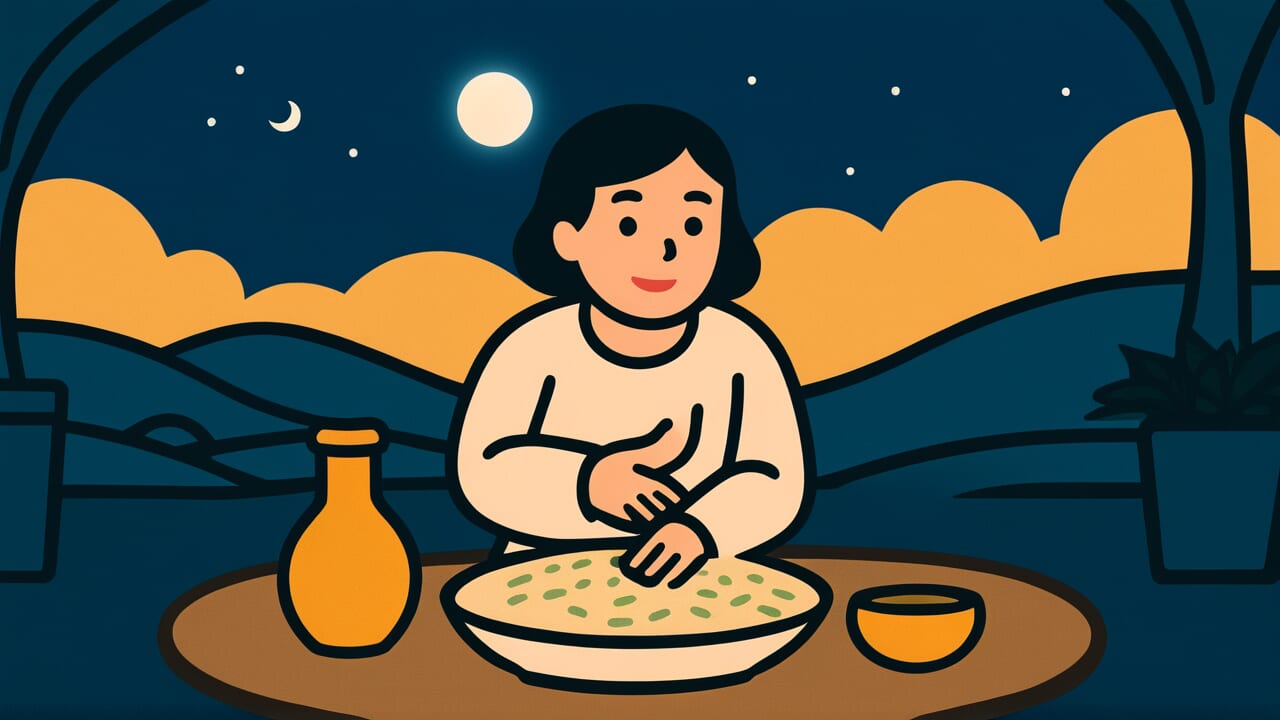How to Read “Always moonlit nights and rice meals”
Itsumo tsukiyo ni kome no meshi
Meaning of “Always moonlit nights and rice meals”
“Always moonlit nights and rice meals” means that luxurious living and fortunate circumstances don’t last forever. It shows the reality that good times don’t continue endlessly, and life has its ups and downs.
This proverb serves as a warning not to become careless just because things are going well now. It can also comfort people going through hard times. The message is that just as good times don’t last forever, neither do bad times.
Today, people apply this proverb to all kinds of “fortunate circumstances” beyond just economic wealth. This includes health, relationships, and career success. It teaches us to stay humble during smooth periods and not neglect preparation. This wisdom remains relevant in modern life.
Origin and Etymology
No clear written records explain the exact origin of this proverb. However, we can make interesting observations by looking at its components.
Let’s focus on the two elements: “moonlit nights” and “rice meals.” In Japan before the Edo period, light at night was precious. Moonlight served as natural illumination for nighttime paths and made moonlit evenings special.
Meanwhile, “rice meals” were also a luxury for common people. They usually ate grains mixed with millet or ate porridge. White rice alone was considered a feast reserved for special occasions.
This proverb expresses “exceptionally fortunate circumstances” by combining two luxuries. A bright moonlit evening with a meal of white rice represented the ultimate happiness for people of that time.
However, the proverb’s real message is that such happy circumstances don’t “always” continue. The moon waxes and wanes, and not every night is moonlit.
Similarly, luxurious living doesn’t last forever. Through this contrast, the proverb conveys wisdom about accepting life’s ups and downs.
Interesting Facts
The “rice meals” mentioned in this proverb were truly special for common people during the Edo period. Farmers had to pay rice as tax and couldn’t freely eat the rice they grew.
They usually ate barley, millet, and other grains as staples. They could only eat white rice on special days like New Year’s or festivals.
The moon’s cycle repeats approximately every 29.5 days. A full moon occurs only once a month, and truly bright moonlit nights are even rarer.
By using the phrase “always moonlit nights,” the proverb describes a statistically impossible situation. This emphasizes the reality that luxury cannot continue.
Usage Examples
- Things are going smoothly now, but it won’t be “Always moonlit nights and rice meals,” so I should save money too
- Times are tough now, but it’s not “Always moonlit nights and rice meals,” so better times will come again
Universal Wisdom
The proverb “Always moonlit nights and rice meals” contains a warning about a fundamental human illusion. It addresses our tendency to assume that current conditions will last forever.
When people are happy, they start to take that happiness for granted. Blessings they initially felt grateful for eventually become “expected.” They then transform into desires for “even more.” This psychology represents an unchanging aspect of human nature from ancient times to today.
However, if we look at nature, everything moves in cycles. The moon waxes and wanes, seasons rotate, and tides rise and fall. Change is the law of nature. Nothing “always” remains the same.
Our ancestors overlapped this natural principle with human life. If there are good times, difficult times will surely come too. This repetition is what life is. This proverb has been passed down because humans repeatedly make the same mistakes.
We lose humility during smooth times and fall into despair during hard times. Our ancestors knew this human weakness. They continued to convey this truth gently yet firmly.
When AI Hears This
When good things happen, the human brain releases a substance called dopamine. However, when the same good thing repeats, the brain reduces the sensitivity of dopamine receptors.
This phenomenon is called “hedonic adaptation” and serves as a survival mechanism. If the brain stayed constantly filled with happiness, it couldn’t detect danger or seek new opportunities.
What’s interesting about this proverb is that two luxuries—moonlit nights and rice meals—exist “simultaneously.” Cognitive science research shows that when multiple positive stimuli are given continuously together, adaptation speed increases compared to when each is given separately.
In other words, gratitude might continue for moonlight alone or white rice alone. But when both always come as a set, the brain re-records this as the “baseline state.”
Furthermore, the brain is designed to respond to change. Research shows that even when income increases, happiness levels return to baseline within months. This happens because the brain detects the difference from the previous state, not absolute wealth.
If moonlit nights and rice meals continue daily, they become a steady state rather than change. The brain stops responding. Simultaneous exposure to luxury is a biological trap that rapidly dulls the neural circuits of gratitude.
Lessons for Today
This proverb teaches modern people wisdom about cherishing “now” while preparing for “change.”
During smooth periods, it’s important to appreciate those blessings and stay humble. Save money when income is stable. Exercise when you’re healthy. Deepen bonds when relationships are good.
These aren’t just cautious measures. They’re active preparations for riding life’s waves.
At the same time, this proverb offers hope to people in difficult times. Even if now is painful, it won’t last forever. Change will surely come. This gives us strength to endure hardships.
Modern society is an era where we constantly see others’ “moonlit nights and rice meals” on social media. However, everyone’s life has ups and downs.
Rather than comparing yourself to others and feeling anxious, accept your own life’s rhythm. That’s the wisdom this proverb teaches about how to live.



Comments